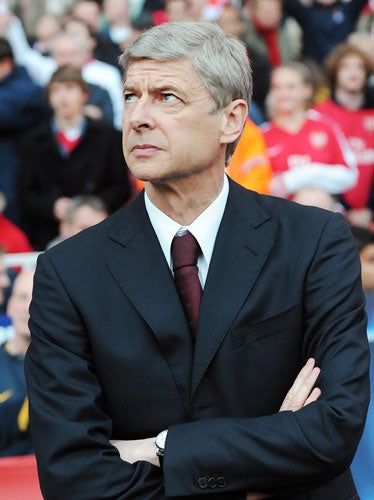Sam Wallace: Wenger should learn a lesson from Ferguson
Even after such a painful defeat against United, Arsenal still need their manager. But it's time for him to find fresh voices to join his coaching staff

Nothing defines a manager more than how he behaves on the occasion of his greatest disappointment, and on Tuesday night Arsène Wenger demonstrated a generosity of spirit that sets him apart. He said that Manchester United deserved their victory; he said it twice, in case you missed it the first time, and he acknowledged the contribution of Cristiano Ronaldo without qualification or recrimination.
In those few minutes in the Emirates Stadium press room you were reminded why Wenger remains such an important part of English football and why those whose faith is wavering need to examine a few basic points. It reminded you of that game in November when an Arsenal team that had already lost to Fulham, Hull and Stoke beat United 2-1, and those of us who had wondered if Wenger really had lost the plot were obliged to make our apologies.
The same mistake should not be made twice. The supporters who gather round the "In Arsène we trust" banner at the stadium every week are not entitled to be selective about when they extend that trust. Even now, five years on from their last league title and four years from the FA Cup final win over United – Arsenal's last trophy – the Wenger project has to be trusted. His team may have felt light years behind United at times on Tuesday but this is no time for Arsenal to abandon their faith in Wenger.
"I know exactly how he feels," Ferguson said of his managerial adversary, "because prior to this everyone put that kind of criticism on me. When you work as long and hard as he has, you deserve success. The problem for Arsène and me is that the longer you are in the game the more labels you attract. Success or failure: there's no inbetween, no grey area. If you are not winning you are useless; if you are, you're great."
So let's explore the grey area. Kieran Gibbs slipped for United's first goal; the referee gave a soft free-kick for the second and within 11 minutes it was all over for Wenger's team. Those were the micro-factors in defeat. What about the bigger picture? Wenger has had the misfortune in the last five years to face the most successful Chelsea team of all time (2004-2006), arguably the best United team of Ferguson's 23 years (2006-present day) and the best Liverpool team since 1990.
Just as the competition in the Premier League left Wenger's side as the only credible challengers to United from 1996 to 2004, so it has conspired in the last five years to provide some daunting opposition. There are factors that give reason for complaint: most people would cite the absence of an established holding midfielder in the side. Wenger would counter that Denilson or Alex Song will be that player, given time.
If there is a distinction to be made between Ferguson's current success and the relatively lean recent years of Wenger, it is that on Tuesday, for all their relative ability, Arsenal were tactically out-thought. The deployment of Wayne Rooney on the left was a masterstroke by Ferguson; so too Ronaldo's role as a lone striker. By contrast Arsenal looked stale. Theo Walcott was not switched to the opposite wing to test John O'Shea when he was shackled by Patrice Evra. Robin van Persie drifted around in areas where he never seemed likely to damage United.
A thought occurs: in his 22 and a half years at United, Ferguson has employed a series of bright young coaches on his staff. From Brian Kidd to Carlos Queiroz and on to one of the current incumbents, the well-regarded Dutchman Rene Meulensteen. Even dear old Steve McClaren, in the seat from 1999 to 2001, must have given him a different perspective. Ferguson might be dictatorial in some respects but he evidently enjoys being surrounded by young coaches with fresh ideas. Wenger has stuck with Pat Rice and Boro Primorac, an old managerial peer from his days in France, and while these are evidently two venerable servants of the club, would the Arsenal manager not benefit from such fresh input? He is ever willing to give a chance to the youngest players in his squad, how about doing the same among his backroom staff?
Among the kind things that Ferguson said about Wenger on Tuesday, most worrying for him was the United manager's prediction that next season he considered Arsenal "one of the biggest threats because they have potential". It is worrying for Arsenal because that is what Ferguson says about Tottenham Hotspur every August before sending them away with a patronising pat on the head.
Arsenal and Wenger are better than that, and those who fear the Frenchman is losing it should remember that only in his 13th season at United did Ferguson win the Champions League. Wenger is just at that stage himself so he is not too far behind schedule. For Ferguson, the challenges became even greater after he turned 60 in 2001 and in time he met them all. Wenger turns 60 in October and having come this far there is no shame in believing that the best may yet be to come.
Join our commenting forum
Join thought-provoking conversations, follow other Independent readers and see their replies
Comments
Bookmark popover
Removed from bookmarks